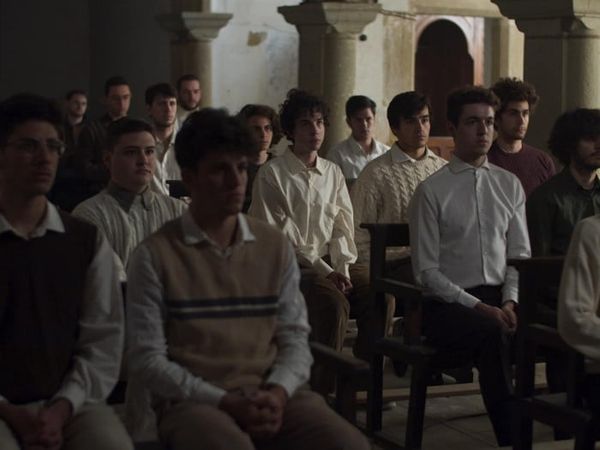Eye For Film >> Movies >> Pile Of Salt (2021) Film Review
Pile Of Salt
Reviewed by: Andrew Robertson

The priest intones, "The sun rose", shining down on Sodom & Gomorrah. The sermon ends with the words of the title. Estatua De Sal, not a "pile" but a pillar of salt. The lot of those who look back.
The roar of the rapids, the blue of the skies, these young faces with their tousled hair and white shirts lazing in the beauty of nature. The Lord's Prayer, before the altar, candle clutched close to the cloister. In the shadows, contrast.

Cigarette and altar wax. Dressed in black, dressed in white. Sleepless by choice, and not. Caught after curfew where they ought not be. Mateo and Salvador. Two strong performances from relative newcomers, all the stronger for their stillness.
The altar fills the frame and dwarfs the devout before it. The body of Christ crucified is not the only one in torment. The communal showers have not the cleansing powers of the blood of the lamb. The mattock is no substitute for the cilice. In the library, whispers, wanting. Unseen, unspoken, unbidden.
These are young men, with appetites, urges. The flesh is weak and faith struggles against it. Sweet mercy and sweet relief are distinct. Prayer should never be punishment, but that does not mean it is reward.
Doubly subtitled from Spanish into Italian and English, there's within that overlapping of Latin-derived and more a microcosm of religious development. "What is all this supposed to mean?" "You are always in my mind" and at once God and the man that clothes him. The only thing that might date us is a particular Mercedes, but that gives us decades of leeway in a tale that goes back millennia. In the chapel consideration of form, in the classical style, reaching fingers and forbidden fruits.
Marc Camardon's film, co-written with Jordi Tortosa, explores familiar themes with verve. Juame Roma's camerawork has the feel of aged stock, a grain and hue that matches the old wood of the seminary, a grime from the sense of a place of men, striving, but not always touching, for godliness. Alicia Tapounet's score and Pau Riedweg's eponymous piece contribute, the use of piano in that mixture of the solitary and the delayed layered upon the contrasts of black and white and touch.
Camardon has the film on his website, and it's commended to you. Note please the dossier that explores the references he is aiming for, the targets he hits. The script too, but referents in Caravaggio, Paul Schrader, gazes male and, often, desirious. This is an achievement, a testament to skill.
Reviewed on: 10 Oct 2021















